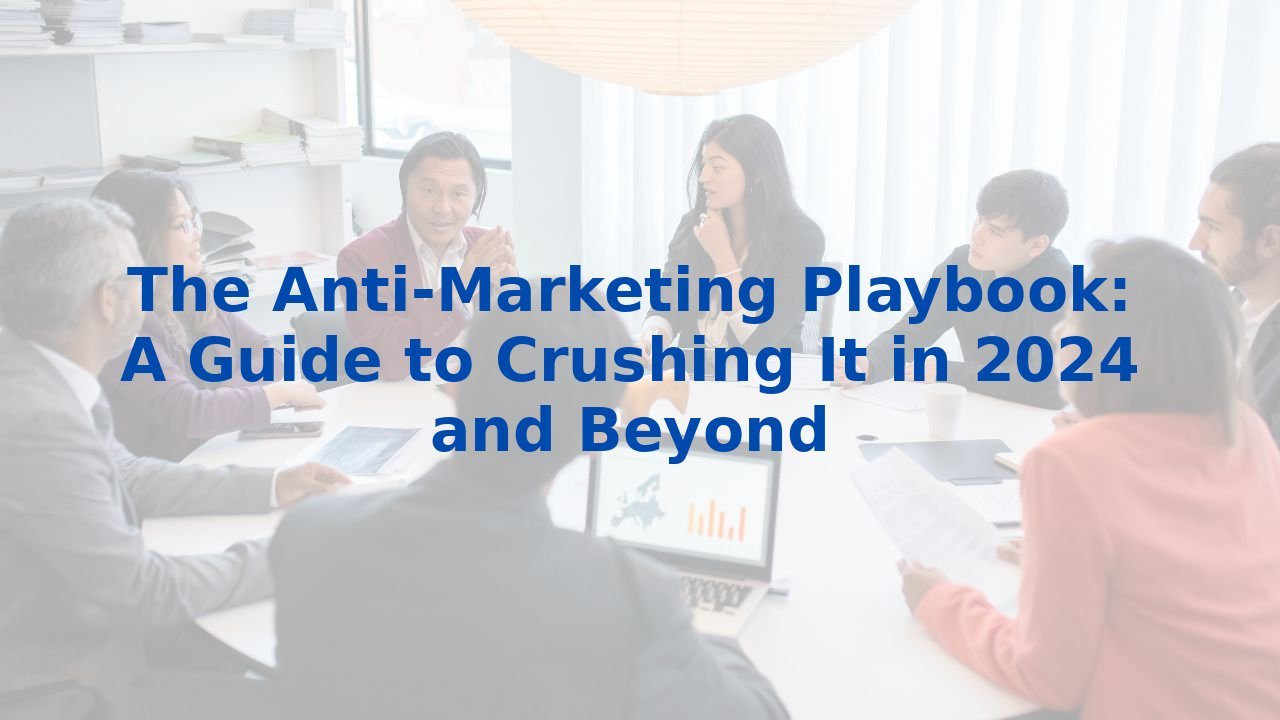The Anti-Marketing Playbook: A Guide to Crushing It in 2024 and Beyond
The Anti-Marketing Playbook: A Guide to Crushing It in 2024 and Beyond
As we propel into a new era of business in 2024, the traditional marketing tactics that once commanded attention may no longer suffice. With consumers increasingly skeptical of promotional ploys, the rise of anti-marketing—a strategy rooted in authenticity and genuine communication—offers a refreshing paradigm shift. In this guide, we’ll explore the essence of anti-marketing, its core principles, the advantages of embracing it, and how AI can amplify these strategies for greater organizational efficiency.
What is Anti-Marketing?
Anti-marketing represents a departure from conventional marketing approaches. It is characterized by a brutally honest engagement with audiences, often leveraging reverse psychology. Instead of bombarding potential customers with sales pitches, businesses can cultivate meaningful connections defined by transparency and relatable messaging. This fundamental shift reflects a desire for sincerity that resonates deeply with modern consumers.
Key Principles of Anti-Marketing
1. Authenticity and Transparency: At the heart of anti-marketing is an unwavering commitment to being real. Brands that admit their imperfections or show the unembellished side of their products foster trust, differentiating themselves from the polished façades of traditional advertising.
2. Minimalistic Advertising: Anti-marketing often employs simplicity—a clean design paired with straightforward messaging. By stripping away the unnecessary noise, brands deliver their core message in a way that’s easy to digest and appreciate.
3. Counterintuitive Messaging: Emphasizing the unexpected can capture attention in a saturated market. Brands that highlight that their product might not suit everyone can spark intrigue and attract a more engaged audience eager for an authentic dialogue.
Benefits of Anti-Marketing
1. Building Trust: As brands cultivate authenticity, a newfound trust blossoms—imperative in a landscape where skepticism prevails. Trust creates loyal customer bases, vital to sustainable growth.
2. Standing Out: By challenging conventional marketing norms, anti-marketing allows brands to transcend the expected. This distinctive voice breaks through the overwhelming chatter of generic ads, positioning them as thought leaders.
3. Enhancing Customer Experience: By documenting real experiences and fostering genuine conversations, brands can offer a more authentic customer journey. This personal touch builds a sense of belonging and community—elements crucial for nurturing enduring relationships.
How AI Can Enhance Anti-Marketing Strategies
It’s here that AI steps in as a game-changer, offering tools that can revolutionize anti-marketing efforts.
1. Personalization: AI excels at analyzing extensive data sets, detecting patterns that might elude human analysis. This capability allows marketers to better predict customer behavior and preferences, ultimately leading to more targeted and impactful messaging.
2. Content Creation: The automation of content generation can free creative minds to focus on strategy and innovation. With AI’s assistance, brands can produce engaging, tailored materials that speak directly to their audience's interests.
3. Customer Insights: Driven by analytics, AI reveals deeper insights into customer behavior. Understanding audience preferences empowers brands to refine their anti-marketing strategies, keeping them relevant and effective in a fast-paced environment.
4. Scalability: Automating routine tasks with AI liberates marketing teams, allowing them to devote time to high-level strategies. This scalability ensures consistent, powerful messaging while maintaining the personal touch that anti-marketing demands.
The Power of Employee Training in AI
To unlock the full potential of AI, investing in employee training is paramount.
1. Enhanced Efficiency: When employees are equipped with AI knowledge, they can leverage data-driven insights more effectively. This reduces errors and optimizes marketing efforts for maximum reach.
2. Improved Decision-Making: Training empowers teams to analyze complex datasets deftly, leading to informed decisions that enhance campaign impact and resonance with the target audience.
3. Innovation: A workforce versed in AI can drive rapid innovation, adapting quickly to shifting market dynamics. In a world where agility is key, having AI-savvy teams can place a brand ahead of the curve.
Conclusion
The anti-marketing strategy offers a compelling approach to today’s marketing landscape. By committing to principles of authenticity, transparency, and counterintuitive messaging, brands can cultivate trust and distinctiveness. The infusion of AI into these strategies enhances personalization, deepens customer insights, and ensures scalability. When combined with a comprehensive training approach for employees, businesses are positioned not just for survival, but for thriving in the dynamic marketplace of 2024 and beyond. Embrace anti-marketing not merely as a tactic, but as a holistic philosophy to connect genuinely and sustainably with your audience.



